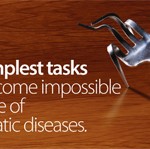Need an Elevator Speech?
This bent-fork lapel pin is a reminder of the simple tasks we do each day that can become impossible if you have a rheumatic disease. Many people think rheumatic diseases are just aches and pains—a part of aging. This isn’t true. Rheumatic diseases often strike in the prime of life and can be devastating, painful, and disabling. And, they can make the simplest tasks impossible. Just as you would see an oncologist for cancer treatment, a rheumatologist is the physician for the treatment of rheumatic diseases.
Source: Simple Tasks Campaign
In the contemporary Western world, unless we are eating sandwiches or soup, almost every meal we eat now entails a fork. We use the fork to spear vegetables and to steady meat as we cut it; to pick food up or to chase it around the plate; to twirl spaghetti; to flake fish; to build up fragments of different foods into a single choice mouthful; or to hide pieces of unwanted cabbage from our parents’ beady eyes.
—Bee Wilson, Consider the Fork
Like many of you, I recently returned from the 2012 ACR/ARHP Annual Meeting in Washington, D.C. And, like you, I was simultaneously excited, informed, challenged, and exhausted. The opportunity to learn new scientific and clinical information, meet with fellow volunteers on ACR committees, and see old friends is a refreshing break from the routine of clinics, teaching, and grant applications. I could not resist the opportunity to sample Washington D.C.’s diverse and fine cuisine with friends and colleagues. The fork served me well.
This year I returned with something different, new, and a bit unusual: a bent fork in the form of a lapel pin. I dutifully pinned it on my lab coat, as did my fellow faculty members and rheumatology fellows at Northwestern, and returned to work. What happened next was unexpected. As I stepped into the crowded elevator at the clinic that Thursday morning, before the coffee had fully kicked in, the person next to me immediately questioned me, “What’s that bent fork on your lapel for?” I hadn’t thought about that during the meeting, while looking at the photos of the Simple Tasks Campaign on the Times Square billboards, or when I pinned it on my coat that morning. I surely hadn’t developed an elevator pitch, so I blurted out a disjointed, “It’s for the American College of Rheumatology Simple Tasks Campaign,” as she stepped off. Did she get it? Did I make any sense at all? No matter, a full clinic and a pile of catch-up e-mails awaited. It was time to get back to work.
